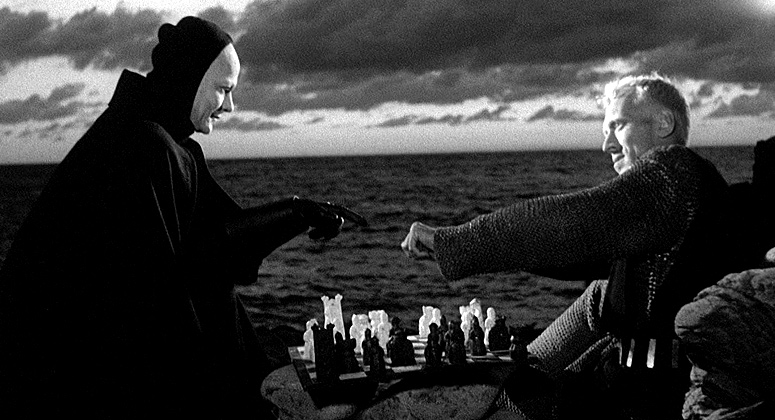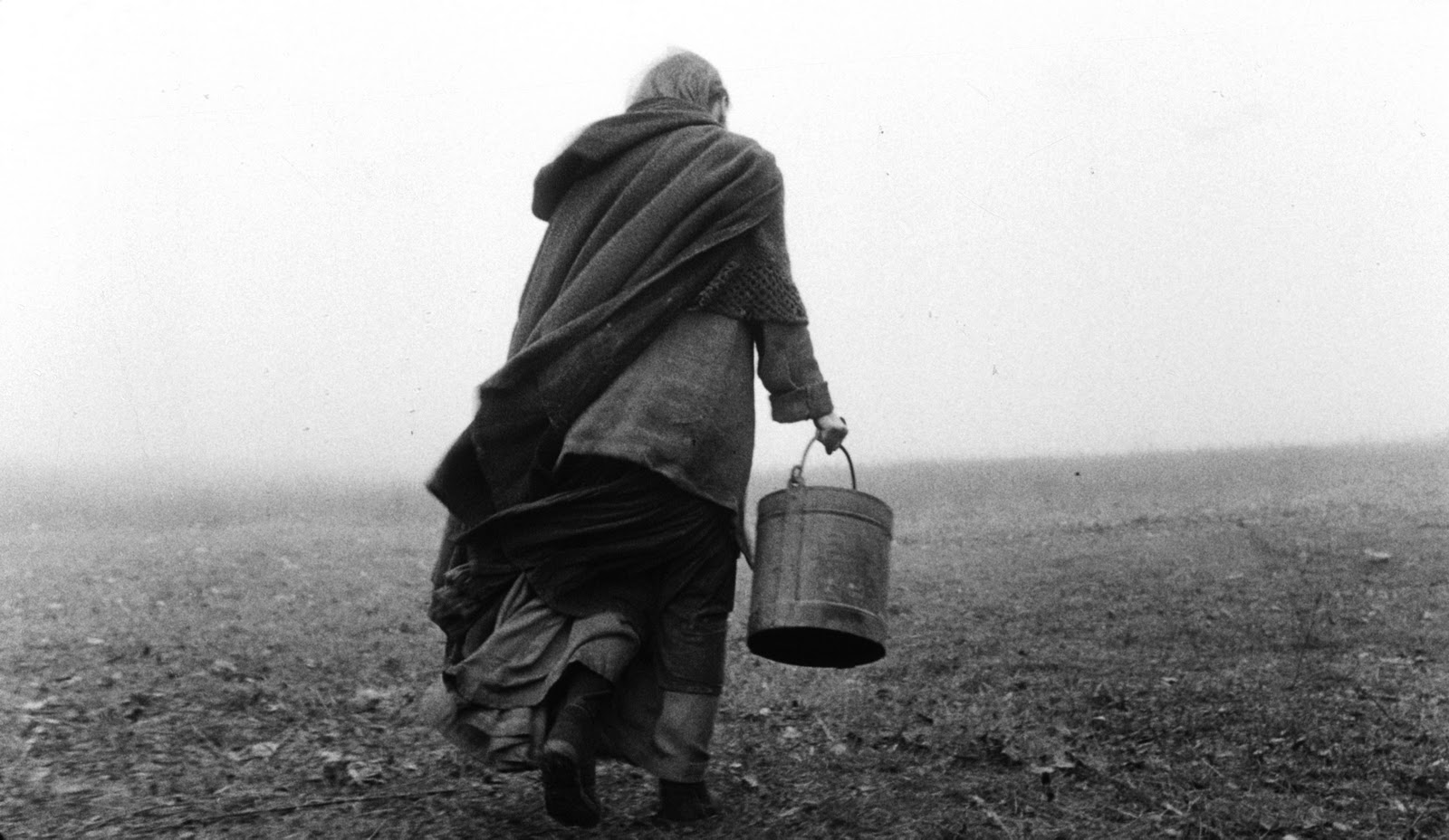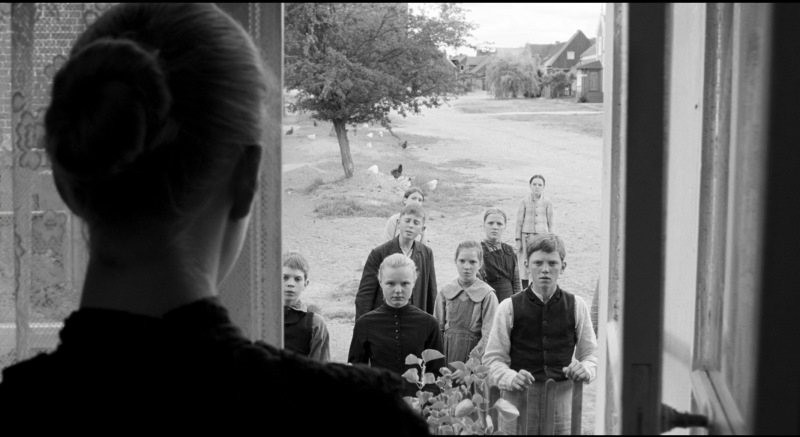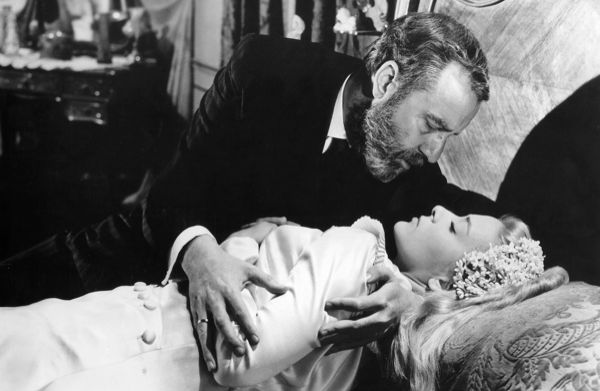6. The Seventh Seal (Ingmar Bergman, 1957)

“No one escapes me”.
– Death
Ingmar Bergman’s essential, indefatigable and unforgettable classic about Death and the horrors of life is a true classic about philosophical pessimism. It is the time of the Black Death. A medieval knight returns from the Crusades filled with despair and hopelessness after all he’s seen and done to see his country decimated by the aforementioned plague.
He wonders and asks fruitlessly and in vain why and how so many horrendous, unspeakable things and so much misery and suffering and agony and evil can happen in the world.
At one point, he sees a man painting a fresco depicting the Danse Macabre. He asks the man, why paint such a thing, as it’ll surely disturb and scare people. The man responds that human beings need to be scared in order to be aware of the realities of existence.
He starts playing chess alone. Then, suddenly, Death appears. He challenges the Grim Reaper himself to a game, in his fear of death, believing he’ll be able to postpone his death as long as the game continues. He agrees.
He later confesses unknowingly to Death that he believes life to be futile and without meaning.
On the way to his castle, the knight, along with Death, encounter and are joined by various people.
Eventually, Death (as always) wins the game. He announces to the Knight that the next time they see each other it’ll be his time as well as all of his journey friends’.
When morning arrives, the knight, his wife and all the friends are seen from the distance being led away by Death in a Danse Macabre.
7. The Tragedy Of Macbeth (Roman Polanski, 1971)

“[…]if you don’t show it realistically then that’s immoral and harmful.”
– Roman Polanski on his adaptation of “The Tragedy Of Macbeth” and its violence
The second greatest play by The Bard as well as his most pessimistic and second most violent in the hands of the great Master Polanski…
What can we expect?
Firstly, this is the single greatest cinematographic adaptation of the Scottish play in history.
Then, of course, the classic tale of corruption, hunger for power, evil, murder, dread, and a man that completely loses all trace of his humanity is very, very vividly brought to the big screen by Roman Polanski.
The story is turned even darker and more pessimistic, with the minor character of Ross being transformed into an evil, cunning ally to Macbeth and a traitor, with an epilogue not present in the play that makes it clear that the cycle of evil, violence and death didn’t die along with Macbeth and Lady Macbeth with Duncan’s son practically taking Macbeth’s place, a magnificent and extremely fitting and unique score by the great Third Ear Band and with a portrayal of the play’s violence and darkness that has never been seen in cinema before or after.
Polanski pulls absolutely no punches, but all the opposite, he makes the audience really feel and experience the horror of this masterpiece by the Bard.
8. The Turin Horse (Béla Tarr, 2011)

“Why all this darkness?”
– The Daughter (Erika Bók) in Béla Tarr’s “The Turin Horse”
Bela Tarr’s greatest masterpiece and swan song uses the classic and rumored tale of German continental philosopher (also considered one of the most prominent proponents of philosophical pessimism, of course) Friedrich Nietzsche being shocked by a horseman’s treatment of his horse at the Piazza Carlo Alberto in Turin, Italy, which caused him to run to the horse, embrace it, cry uncontrollably and then collapse on January 3, 1889, as a metaphor for the origin of this sublime film.
This stunning work of art explores, according to the author himself, “the heaviness of existence”.
Over the course of two and a half hours, in a film made up of 30 takes, we witness six days of the mind-crushing routine of a father, named Ohlsdorfer, and a daughter (perhaps somewhere in Hungary in the 19th century), who live in a small wood cabin literally in the middle of nowhere, and whose sole source of income is to transport goods (mainly wooden logs) in a carriage dragged by their horse to the nearest village (which is still very far from the cabin) to sell them.
Suddenly, an extremely powerful and destructive wind storms arrives and the horse refuses to eat, drink or walk.
The man, who presumably is the person who lives closest to them, arrives to inform them that the village has been completely destroyed by the storm and is no more. There’s nothing left. He goes on explaining how it’s just the beginning of the end, an end that’s been waiting to happen since the dawn of time, and that is being accelerated due to the vicious and savage nature of humankind, which debases and destructs everything it touches and how there could have never really existed “goodness” in the world, for everything is corrupt and evil by nature and that if there were any kind of “higher beings” they’d do nothing but contribute to the misery, debasement, destruction and ultimately end of everything with glee.
The time passes by. A band of gypsies try to steal water from the family’s well, but the father sends them away, but not without them “cursing” the family. The next day, there is no more water in the well. The horse has finally given up completely and awaits imminent death.
Then light disappears, even light produced by oil lamps and lit embers. Darkness, emptiness, destruction and nothingness take over.
The film ends with an static shot of four minutes, almost completely in darkness, of Ohlsdorfer and daughter sitting at the table trying to eat what they always eat: one potato each. Except they don’t even move anymore. They can’t. Ohlsdorfer mutters: “We must eat, we must go on.” But they remain motionless. Soon darkness begins consuming what little light was present, slowly gaining victory. The end is the victory of darkness. There is nothing else left anymore at all. It’s over.
9. The White Ribbon (Michael Haneke, 2009)

This is Michael Haneke’s fable/social critique of the Germany that raised the generation that put Hitler in power.
In a small village, strange accidents begin happening. A small village where abuse, insane and sick methods of parenting, and evil are natural and devastatingly usual though unspoken happenings.
People who are different and people with dark secrets are being routinely punished by a group that cannot be identified.
Evil and death begin to reign over the village. Then, the villagers are informed the country is now at war (the year is 1914).
10. Viridiana (Luis Buñuel, 1961)

This is an absolutely essential masterpiece by Luis Buñuel. It tells the story of a young novice who has no family except for an uncle who’s always paid for her studies.
The uncle sends a letter to the convent to ask Viridiana to come visit him at his state before taking the vows and becoming a nun. She refuses, but the Mother Superior insists and orders her to visit her uncle.
Viridiana agrees, and what follows is a series of portrayals of the worst aspects of the human species. Rapes, suicides, abuses, and most of all people taking advantage of each other at every turn.
The end for Viridiana won’t be a nice one at all.
Watch this film. This is what happens to people who think they’re better than everybody else, but would never admit it to anyone and want to help others.
Author Bio: Lee Schroeder is a member of the so-called Y Generation. He likes movies, literature, music, photography and Art in general. He also likes to sleep. He doesn’t have facebook, twitter, instagram or linkedin accounts. Make of all this what you will.